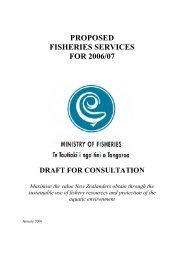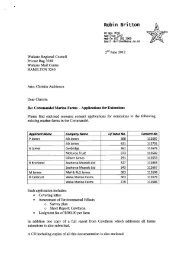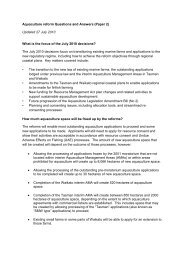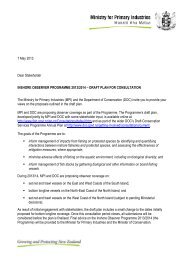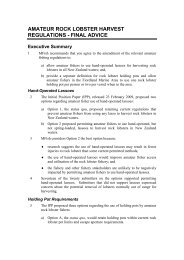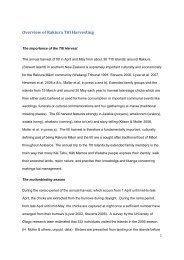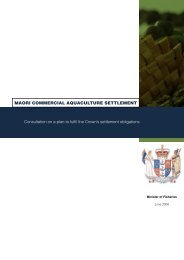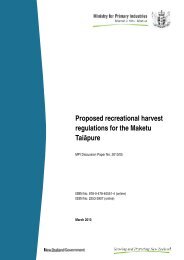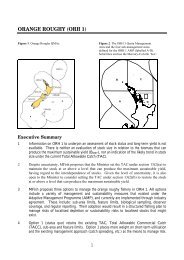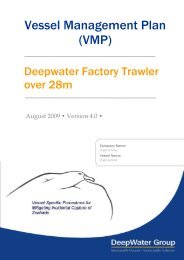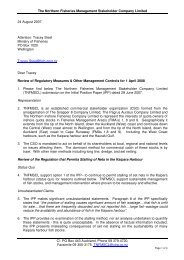review of potting definitions - Ministry of Fisheries
review of potting definitions - Ministry of Fisheries
review of potting definitions - Ministry of Fisheries
You also want an ePaper? Increase the reach of your titles
YUMPU automatically turns print PDFs into web optimized ePapers that Google loves.
impose pot alteration or replacement costs (approximately $500 to $600 per<br />
pot) on 22 blue cod fishers who likely use pots that do not have mesh <strong>of</strong> 48<br />
mm or more. The level <strong>of</strong> costs incurred would depend on the number <strong>of</strong> pots<br />
that fishers deploy, and they may choose to stop fishing if alteration or<br />
replacement <strong>of</strong> pots is too costly.<br />
92 Recreational fisheries – Option 3 proposes to authorise <strong>potting</strong> for blue cod<br />
and octopus in the amateur regulations, and the octopus pots would be subject<br />
to the same pot specification proposed in the commercial regulations. There is<br />
a high likelihood that octopus pots without such a specification would catch<br />
rock lobster since the pots likely be placed in some rock lobster fishing areas.<br />
However, as previously discussed under Option 2, MFish is unaware <strong>of</strong><br />
recreational <strong>potting</strong> fisheries for octopus.<br />
93 Option 3 would extend pot authorisation to all blue cod fishing areas in the<br />
amateur regulations without requiring pot specifications. As discussed for<br />
Option 2, available information suggests that the minimum mesh size may<br />
provide stock sustainability benefits for blue cod and MFish seeks input on<br />
the likely impacts on fishers if the 48 mm minimum mesh size requirement<br />
was considered for recreational blue cod fisheries at some point in the<br />
future.<br />
Paddle crabs, deepwater crabs and hagfish<br />
94 Commercial fisheries – Option 3 would not directly impact commercial fishers<br />
in the paddle crab, deepwater crab, and hagfish fisheries since they would be<br />
authorised to continue current <strong>potting</strong> practices. The primary benefit <strong>of</strong><br />
Option 3 is to improve fisheries management credibility.<br />
95 Recreational fisheries – Option 3 would authorise current <strong>potting</strong> practices in<br />
the paddle crab recreational fishery. MFish is not aware <strong>of</strong> any recreational<br />
<strong>potting</strong> fisheries for deepwater crabs or hagfish.<br />
All other <strong>potting</strong> fisheries<br />
96 Option 3 would authorise <strong>potting</strong> for all other species so the effects on these<br />
stocks would likely be unknown. MFish would monitor ongoing development<br />
<strong>of</strong> these fisheries to determine whether further management measures,<br />
including pot specifications, would be needed.<br />
Impacts on rock lobster fisheries<br />
97 Option 3 introduces additional uncertainty about the risk <strong>of</strong> impacts on rock<br />
lobster fisheries since <strong>potting</strong> would be authorised for snapper and other<br />
<strong>potting</strong> fisheries, which may result in additional pots being deployed in some<br />
rock lobster fishing areas.<br />
98 Snapper – Option 3 proposes to authorise <strong>potting</strong> for snapper (through<br />
authorisation <strong>of</strong> pots for all species) to reduce constraints on utilisation.<br />
99 Snapper and rock lobster are caught at similar depths (10 metres – 100 metres)<br />
and can be found in the same types <strong>of</strong> habitat, so it seems likely that snapper



